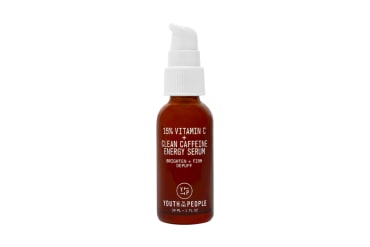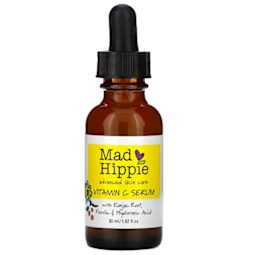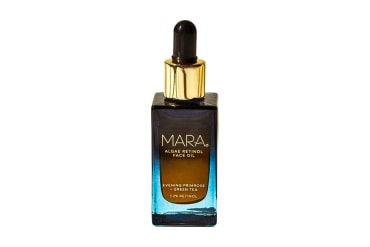Advertisement
Here's How To Use Vitamin C + Retinol Together For Radiant Skin


With all of the buzzy skin care staples out there (hyaluronic acid, niacinamide, etc.), it's only natural to want to reap the benefits of them all. However, as many beauty fans know: Layering skin care ingredients is a very tricky venture, especially if you're dealing with notoriously unstable actives.
Case in point: vitamin C and retinol. Both of these ingredients offer wonderful and unique skin-related benefits, but can (and should) they be used together? We asked the pros to find the answer.
What is vitamin C?
First, let's be clear on what each of these products can do. As clean cosmetic chemist Krupa Koestline explains, "Vitamin C is a potent antioxidant capable of neutralizing oxidative stress caused by pollution, UV, and other environmental stressors."
Oxidative stress can lead to a plethora of skin-related troubles, including the loss of collagen fibers resulting in skin sagging, fine lines and wrinkles, and texture changes. Luckily, vitamin C can be of assistance. Here, a quick list of benefits, according to Koestline:
- Fades dark spots: Using vitamin C topically has been shown to help overall quality and tone by diminishing hyperpigmentation1 and brightening2 the complexion.
- Eases fine lines and wrinkles: Vitamin C is a crucial part of the collagen synthesis process; your body cannot effectively produce collagen without the antioxidant3. Plus, it also stabilizes the collagen1 you already have, leading to overall wrinkle reduction.
- Enhances glow: Again, vitamin C is a potent antioxidant, meaning can fend off free radicals and support a glowing complexion.
What is retinol?
The term "retinol" refers to a compound derived from vitamin A. Technically, retinol falls under the umbrella category of "retinoids," which include all vitamin A derivatives.
Some retinoids, like tretinoin and Tazorac, are stronger and thus require a prescription. However, you can also find gentler over-the-counter retinols that have similar skin care benefits (those are the ones we are talking about today).
Retinoids, retinol included, work by increasing cell turnover in the skin and promoting collagen production. Here, some notable benefits of retinol:
- Eases fine lines and wrinkles: Retinol has been scientifically shown to increase collagen production in the skin4, thereby reducing the appearance of fine lines and wrinkles.
- Exfoliates skin: "Besides stimulating production of new collagen, retinol enhances cell turnover," board-certified dermatologist Joshua Zeichner, M.D., says regarding the ingredient. "This means it sheds dead and damaged cells that make the skin look dull."
- Helps with acne: Retinol also exfoliates within the pores, "where slowed dead cell shedding leads to enlarged pore appearance and breakouts," board-certified dermatologist Loretta Ciraldo, M.D., FAAD, once shared with mbg.
Can you use them together?
So now you know what retinol and vitamin C do for the skin separately, but what happens when you combine them? Well, you might just hit the jackpot of skin care when utilizing the power of both products, but it's important to do it right.
Board-certified dermatologist and YouTube content creator Andrea Suarez, M.D., FAAD, cautions against using the two at the same time. "The two ingredients and their respective formulations can sometimes be very irritating if used together," she says. Not to mention, layering them one after the other might render them ineffective.
As a general rule of thumb: Use retinol at night and vitamin C in the morning. "To get the most benefit from vitamin C, you want to use it during the day to protect the skin while exposed to environmental stressors such as the sun and pollution," celebrity esthetician and skin expert Shani Darden tells mbg. On the flip side, retinol can promote cell turnover while you snooze. Not to mention, it's much safer to apply retinol in the evening, as it can sensitize your skin to sun exposure.
Here's a quick breakdown, if you'd like to see the routine all planned out:
- In the morning, apply your vitamin C serum to clean, dry skin (that way, the actives can better penetrate the skin). Then follow up with the rest of your skin care routine (might we suggest a hyaluronic acid serum?), and of course, top it all off with SPF.
- In the evening, retinol will be your go-to active. Again, apply your product of choice on clean, dry skin, and let it dry before proceeding with the rest of your routine. Just know that retinol serums can dry out the skin, especially when you first start using them, so be sure to follow up with a moisturizer every night. (And if your skin is super sensitive, you can layer retinol over moisturizer to buffer the effects.)
Vitamin C and retinol are most often found separately since they are each potent actives in their own right, but some formulas do combine both steps into one. Modern advancements in skin care technology can safely combine certain forms of vitamin C and retinol, and Suarez notes that these products are specifically formulated to be applied in unison.
That being said, it may be best to use these combo products at night, given the photosensitivity risk that comes with retinol.
mbg's picks for vitamin C + retinol products:
Pros
- Affordable
- Also includes hyaluronic acid
Con
- Not sold in many stores
Key ingredients:
hyaluronic acidglycerinvitamin Evitamin CThis one is an automatic winner, thanks to the wonderful cocktail of ingredients. Vitamin C is accompanied by plumping hyaluronic acid as well as vitamin E, which works to stabilize the formula and hydrate the skin. If you're looking to combine a few steps in your morning routine, definitely consider this serum from Mad Hippie.
Best splurge vitamin C: Youth to the People 15% Vitamin C + Clean Caffeine Energy Serum

Pro
- Helps depuff
Con
- Pricey
Key ingredients:
caffeinepassion + dragon fruit extractvitamin CIf you wake up puffy in the morning, you should be pressing "Buy now" immediately. This serum combines plant-derived caffeine from yerba mate and guayusa to help visibly reduce puffiness and rehydrate the skin. A whopping 15% dose of vitamin C helps to brighten the complexion and protect from environmental stressors throughout the day.
Advertisement
Pro
- Jam-packed with nutrients
Con
- Pricey
Key ingredients:
algae extractsfermented green tea extractretinolevening primroseThis luxury night oil encourages clear, radiant skin. A strong 1.2% retinol, and natural sources of vitamin A to rejuvenate and reveal healthy youthful-looking skin while algae extract moisturizes the skin and reduces fine lines and wrinkles alike. This phytonutrient powerhouse contains evening primrose, fermented green tea, and hemp-derived cannabis oil. It may be pricey, but you will be getting a bang for your buck with this multitasking face oil.
Pro
- Affordable
Con
- Not the best for sensitive skin
Key ingredients:
retinolbakuchiolvitamin ERetinol products are notoriously pricey, which is why finding this high-quality, affordable serum feels like striking gold. Naturium blends encapsulated retinol with popular retinol alternative bakuchiol. Vitamin E helps to stabilize the retinol cocktail and hydrate the skin. Together, these actives encourage a radiant, smooth, and even complexion.
Advertisement
The takeaway
Vitamin C and retinol are two potent skin care ingredients that have been around forever, yet there's still some confusion in terms of layering. The bottom line? Both of these ingredients have a worthy place in your skin care routine but should be used separately.
Remember: Use your vitamin C followed by SPF in the morning and your retinol followed by moisturizer in the evening. If you want to learn even more about which ingredients you should and shouldn't layer, here's a quick guide.


